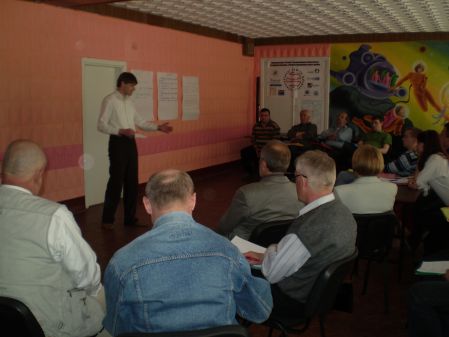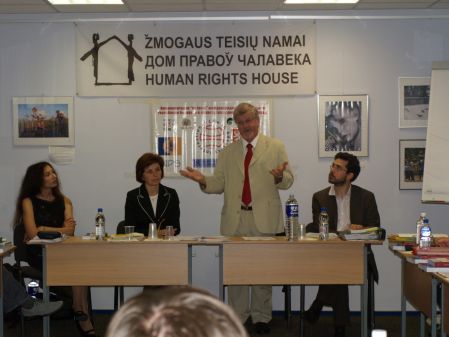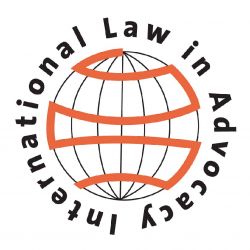Launched in 2009 and supported by Human Rights House Network the International Law in Advocacy program helps to bring up an expertise level of human rights defenders. Also it assists in harmonising the national human rights system in line with international standards. The program includes two projects: Bring International Standards Home, where a second group of activists getting their hands at the moment and will last until 2010, and Electronic Human Rights Education for Lawyers.
The first phase of seminars within the framework of the International Law in Advocacy program took place in Chernihiv, Ukraine on 3-9 May 2009.
A letter by a prominent human rights defender Leanid Svetsik was read at the opening, since he had no possibility to greet participant in person. He was held by the authorities charged with instigating racial and national enmities in accordance with article 130 of the Belarusian Criminal Code. Recently he was found guilty and has to pay a hefty fine. His lawyer Pavel Sapelka called this verdict a provocation. Human rights defenders, Svetsik’s colleagues, believe that he was punished for his activities and a firm stance against the authorities.
In his address Mr Svetsik noted that “human rights, as a field, are in the process of establishing and developing itself. However, there are brave women and men, who consider human rights to be of the absolute value to them. And for these values they are willing to continue a relentless fight, sacrificing certain personal gains in their name. Human rights defenders are people who made a conscious choice to always be between authorities and people, as shields and mediators. And no matter who is in power they will always remain here, in their role and place. Abuses will be in any kind of regime.” He also stressed a great responsibility that the seminar participants had to bear: “not only readiness to defend their own rights but also those of common citizens” will depend on their skills.
The Chernigiv seminar had included several parts. In the first, the main focus was made on international and constitutional law as the main instruments to defend the human rights. Legal instruments developed by UN and the Council of Europe were studied to set a standard domestically. Summing up the joint experience of several participants from all regions of Belarus Aliaksandr Karliou said that "the authorities had to fulfil their promises signed in international law treaties to guarantee the human rights.”

The second part dealt with individual rights such as the rights of free expression, right of association, right of fair trail. The practice of European Human Rights Court was studied in detail. Participants had a chance to discuss various questions related to the human rights situation in Belarus, a moratorium on the execution of the death penalty was amongst them.
A special stress was made on a practical knowledge during the seminar. Participants had a chance to learn first hand how Ukraine implements the human rights standards. They visited several governmental institutions to acquaint themselves with their practices and procedures.
The seminar participants received informational materials and tasks to use international standards of human rights activities on a domestic level. It is hope that the expertise gained during the seminar will help Belarusian human rights defenders to prepare individual addresses to the authorities and to special international institutions documenting human rights abuses
The second phase of seminars was organised with the support of the OSCE/ODHIR, European Commission and the Human Rights House Foundation on 25-29 June at the Belarusian Human Rights House in Vilnius.
First, Anita Trimaylova, the UN Committee on human rights officer, introduced the system of submitting complaints to the committee. Then Benjamin Maro, an OSCE/ODIHR officer, took over in the part dedicated to international human rights standards.
A part of the lectures was devoted to a legal assessment of national legislation and court practices related to human rights. Monitoring of human rights was also discussed.
In the practical part of the seminar, the participants learnt how to file complaints, and individual complaints in particular, to the UN Committee on human rights with focus on procedures that follow thereafter.
Siarhiej Balykin, a lawyer from Maładziečna, summed up the participants impression: “We are very glad that in such a short time the organisers could deliver maximal amount of information. We are certain that it would help us correctly and with expertise to file any future complaints.”
 One of the seminar highlights was a visit by the Irish ambassador in Lithuania Donal Denham. He stressed the importance of work to develop and improve human rights activities.
One of the seminar highlights was a visit by the Irish ambassador in Lithuania Donal Denham. He stressed the importance of work to develop and improve human rights activities.
Next seminar within the framework of the International Law in Advocacy is planned to happen in Vilnius in August this year.





